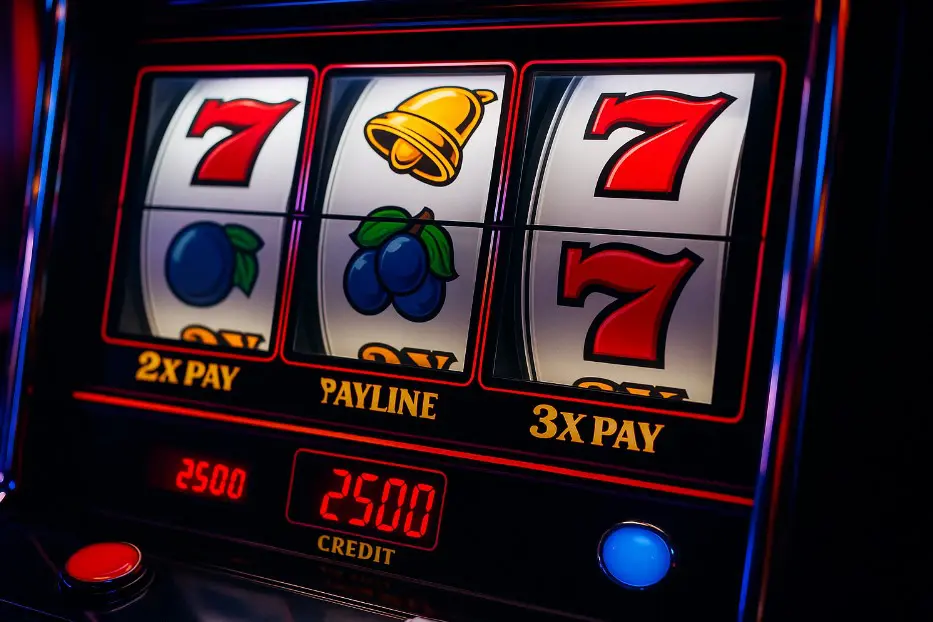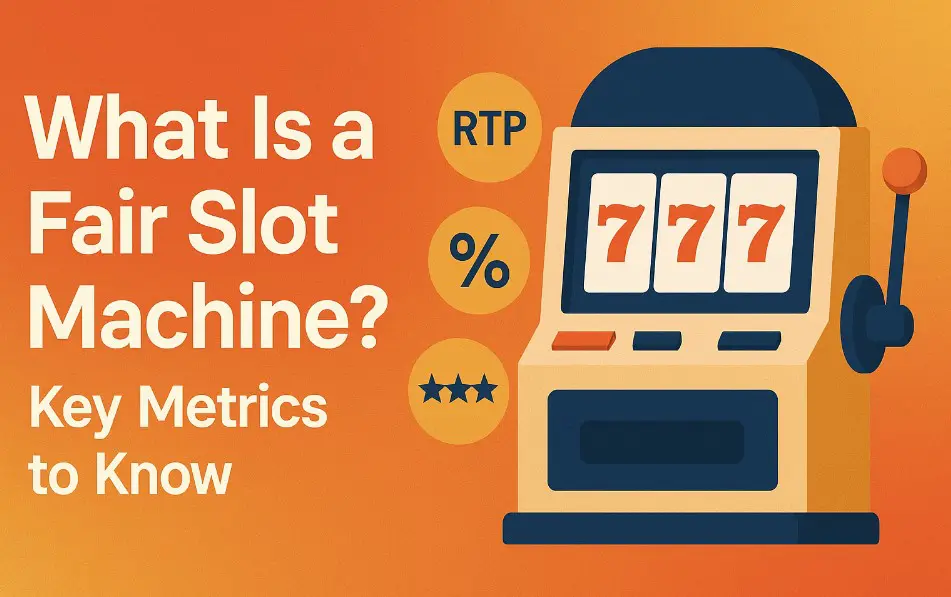Let’s be honest — most of us have, at some point, stared at a slot screen and thought, “That can’t be random.” Maybe you were one spin away from a jackpot, or you watched someone else sit down right after you and hit the bonus. It’s a familiar sting. But when we talk about a “fair” slot machine, what we’re really talking about is math — not moods, not timing, not cosmic injustice. Still, there’s a human side to it, too. Fairness isn’t just numbers; it’s also about trust.
So, how do you tell if a slot is fair? Let’s peel back the layers of flashing lights and bonus jingles to find out.
What Fairness Actually Means in Slot Machines
Fairness in slots doesn’t mean equal chances of winning big. It means every spin — every single one — has the same odds, no matter what happened before. No hot streaks coded in, no payback cycles, no “it’s due” moments.
A fair slot runs on an algorithm called a Random Number Generator (RNG). It’s constantly spitting out random sequences, whether anyone’s playing or not. When you hit spin, the game simply picks the latest number in that sequence and translates it into symbols on your reels. That’s it. No drama, no manipulation.
A friend of mine once swore that his “lucky machine” was fairer than the rest because it “felt right.” He even rubbed the start button before every spin like it was a ritual. The truth? His odds didn’t change one bit. But hey, rituals make the randomness a little more personal.
The Real MVP: Return to Player (RTP)
If you’ve ever seen a game listed with “96% RTP,” that’s the Return to Player percentage — and it’s a key fairness metric.
Think of RTP as the game’s long-term honesty score. A slot with 96% RTP means that over millions of spins, it’s designed to return 96% of all wagered money back to players. The remaining 4%? That’s the house edge, the casino’s built-in profit margin.
Now, here’s the catch: RTP doesn’t guarantee short-term fairness in the emotional sense. You could hit a jackpot in two spins or lose a hundred in a row. It averages out only over huge sample sizes.
I once saw a guy hit a 5,000x win on a game with just 94% RTP and walk away saying, “See? It’s the loose one.” Statistically, it wasn’t. But human brains love patterns — even imaginary ones.
The House Edge: The Casino’s Quiet Advantage
The house edge is the flip side of RTP. If a slot has 97% RTP, that’s a 3% edge for the casino. It doesn’t mean you lose 3% every session. It means that if everyone kept playing indefinitely, that’s the cut the casino would keep overall.
Casinos don’t need to cheat — the math does the work for them. A fair slot just sticks to the math without tricks.
You can think of it like a poker game where the house doesn’t play a hand but takes a tiny rake from every pot. Over time, that rake builds up into steady profit. Fairness, in this sense, is about transparency, not generosity.
Hit Frequency: Why It Feels Fair or Not
Ever play a slot that pays small amounts all the time? It feels forgiving, right? That’s hit frequency at work — the rate at which a slot produces winning spins.
A slot might pay out on 30% of spins, but most of those are small wins that barely cover your bet. Another game might only hit 10% of the time but drop massive bonuses when it does. Both can have the same RTP, yet feel worlds apart.
There’s a casino in Auckland where I used to play a pirate-themed slot that hit often but rarely for more than a dollar. The crowd around it loved it — not because they were winning big, but because the game kept them in the action. Fairness, to many, is about engagement, not payout size.
Volatility: The Slot’s Personality Type
Volatility, or variance, is the mood swing factor. High-volatility slots are the roller coasters — long quiet stretches, then explosive wins. Low-volatility slots are steady, low-drama games that pay out little but often.
Neither is more fair; they just serve different tastes.
If you’ve ever played Dead or Alive II, you know that edge-of-your-seat feeling during 200 dead spins before the bonus drops like thunder. Compare that with something like Starburst, which feels friendly, colorful, and forgiving. Same math principles, totally different emotional experience.
Players often confuse volatility with fairness because high-risk games feel punishing. But fairness doesn’t mean comfort — it just means honesty in probabilities.
RNGs: The Invisible Fairness Machine
Every fair slot depends on one thing: its Random Number Generator.
Imagine a machine that never sleeps, producing millions of random numbers every second. The instant you hit spin, the RNG freezes on one number, which determines where the reels stop. That’s your result. No sequence, no memory, no bias.
Independent labs like GLI, iTech Labs, or eCOGRA run simulations on billions of spins to make sure the RNG isn’t skewed. They literally torture-test these algorithms for randomness.
I once saw a demo where a developer showed how a single bit of predictable code can make an RNG fail certification. It’s wild how much science goes into keeping your 50-cent spin honest.
Certification: The Human Oversight Layer
Even the best RNGs mean nothing without oversight. That’s why every legitimate slot is tested by third-party auditors before launch.
Labs like BMM Testlabs, GLI, and eCOGRA examine everything — RNG algorithms, payout frequencies, even how bonus rounds trigger. They use statistical tests like Chi-square analysis to make sure results follow a random pattern.
Gaming commissions such as the Malta Gaming Authority, UK Gambling Commission, or New Jersey DGE then issue licenses that confirm compliance.
It’s like a report card for your slot: if it’s certified, it’s fair. If there’s no certification mentioned anywhere, that’s your red flag right there.
Provably Fair Technology: Trust in Code
In the world of crypto casinos, provably fair slots take transparency to a new level. These use blockchain to record every spin result, allowing players to verify outcomes using cryptographic hashes.
You get a “server seed” from the casino and a “client seed” from your device. Combined, they determine your spin. Afterward, you can check that the hash matches — meaning the casino couldn’t have tampered with the result.
It’s a little techy, sure, but it’s the digital version of a casino letting you shuffle the deck yourself. For players who grew up skeptical of rigged games, that kind of openness feels revolutionary.
Common Myths About Slot Fairness

Let’s tackle a few myths that never seem to die, no matter how many times they’re debunked.
Myth 1: Slots tighten up after a jackpot.
Nope. RNGs don’t care who won or lost five seconds ago. Each spin is a new coin toss in digital form.
Myth 2: Casinos adjust payouts during busy hours.
That’d be illegal in any regulated jurisdiction. Slots are tested, sealed, and certified before use. Operators can’t tweak live odds.
Myth 3: A slot is “due to pay.”
Slots have no schedules. What feels like a pattern is usually just coincidence or clustering — randomness playing tricks on your brain.
Myth 4: Bonus rounds are rigged to disappoint.
Nope again. The same RNG governs bonus outcomes. It’s just luck, not conspiracy.
I remember watching an old-timer at a pub say, “I can feel it coming.” He was grinning ear to ear, spinning on fumes. He didn’t win, but he walked away happy — and that, weirdly enough, is part of why slots work. They balance math and emotion like no other game.
How to Spot a Fair Slot Machine
Even if you’re not a math nerd, you can still make smart picks. Fairness leaves clues.
- Check the RTP. Anything below 94% is stingy. 96% or higher is solid.
- Look for certification logos. eCOGRA, GLI, iTech — those are green flags.
- Play at licensed casinos. Regulated platforms can’t legally alter fair RNGs.
- Research volatility. Match the game’s pace to your mood (or your wallet).
- Avoid shady offshore sites. No license, no audit, no reason to trust it.
If the game hides its RTP or doesn’t name its testing lab, walk away. Fair slots are proud of their transparency.
The Player’s Role in Fairness
Here’s something players forget: even fair slots can feel unfair if your expectations are off. The randomness doesn’t care about your “gut feeling” or your lucky hoodie.
Fairness is a partnership. Developers have to keep things transparent and certified; players have to understand what they’re signing up for — unpredictable outcomes and all.
One of my old gambling buddies used to say, “Fairness doesn’t mean you win; it means you could.” I think about that line every time someone asks if a machine is rigged.
The Real Measure of Fairness
A fair slot machine doesn’t owe you a jackpot. It owes you honesty.
When the math, certification, and technology all align, that’s as fair as gambling gets. The rest? That’s luck — the unpredictable, chaotic kind that keeps people pressing spin long after midnight.
So next time you’re chasing that bonus feature, remember: fairness isn’t about how it feels. It’s about whether the game gives everyone the same shot at glory.
And maybe, just maybe, that’s what makes it fun — that little spark of mystery behind every perfectly fair spin.


